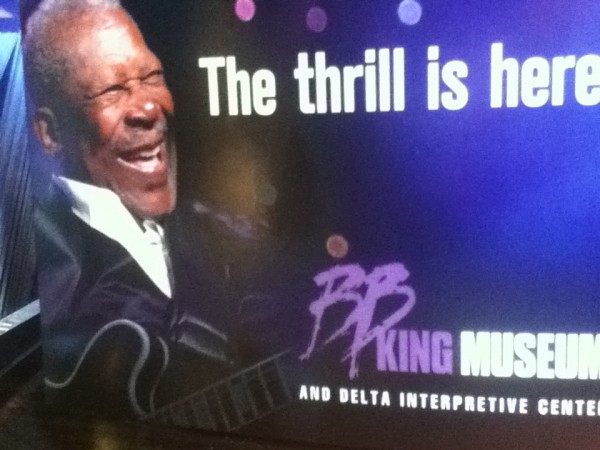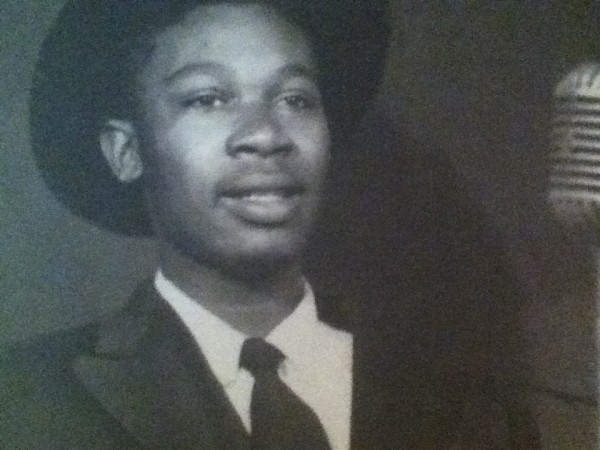Today, the one and the only king of the blues, B.B. King is 87 years old still traveling 360 days a year, performing 200 concerts a year with his ebony queen guitar, Lucille. Yes, the THRILL IS HERE…!
In King’s childhood home, there was little music but he got plenty of inspiration at church. He grew up singing in a gospel choir and the pastor there, his first idol, played the electric guitar, preached and sang. In turn, King bought a $15 acoustic guitar when he was 12. Eventually, playing gospel on the streets, it was the lousy tippers who led King to performing the Blues for bigger tips.
In 1948, King began working at a Memphis radio station as a singer and disc jockey called “The Beale Street Blues Boy” – soon shorten to “B.B.” In 1948, he began recording and touring as “B.B. King”.
Yes, it was a woman who inspired King to name all his guitars “Lucille.” It happened in 1949 when he was playing at a place in Twist, Ark. It was very cold and they had a big garbage pail filled with lit kerosene for heat. Two guys started fighting, and one knocked the other into that barrel, and it spilled on the floor. The place was burning rapidly, everyone ran outside, and King left his guitar inside. Even though the building was falling in, King went back for his guitar. In turn, he almost lost his life. Two people died that night, and the next day, King learned the men that caused it all had been fighting over a woman. King never did meet her, but they said her name was Lucille. He named his guitar Lucille as a reminder to never do something so foolish again. And he hasn’t. He just works…non-stop. He has been honored by every musician that has played with him for his kindness and his professionalism.
King has won 15 Grammy Awards and has created dozens of hits, including the “The Thrill is Gone” and “Lucille.” He was inducted into The Blues Hall of Fame in 1980 and The Rock and Roll Hall of Fame in 1987.
The Mississippi Delta where King was born is the distinctive northwest section of Mississippi and generally considered to be the birthplace of the Blues, with the new musical form emerging around the turn of the 19th century. But the story of the Blues dates back before the Civil War and to the West coast of Africa where countless men, women and children were captured by slave traders and shipped across the Atlantic for forced labor on Southern plantations when it was one of the richest cotton-growing areas in the nation.
Slaves from many African countries carried the songs and music of their respective homelands to America. There, amidst the hard work, fear and oppression, the slaves found a temporary escape in music and expressed both hope and despair in their songs. The musical traditions of numerous African cultures blended as the slaves worked side by side in the steamy fields of the south. Field hollers and work songs were a means of expression and communication — which were often not otherwise allowed by the plantation overseers. With few instruments and little or no money, the slaves used their own voices and clapped percussion as musical tools. Their original methods of creating music became significant elements in the creation of the raw Delta Blues style.
As slaves — and then freed slaves — became more integrated into American culture, the church became a regular part of their Sundays. While the white churchgoers sang formal hymns, the black Southerners brought their passionate vocals, clapping, stomping, and call-and-response methods of singing into their own churches. By the 1870s the Mississippi Delta was fertile ground for the roots of the blues. With its history of slavery, racial oppression, the Ku Klux Klan, and Jim Crow laws, plus baking heat, rampant illiteracy and poverty, the Delta was a cruel place for many African Americans well into the middle of the 20th century. The Blues documented the experience of southern blacks better than any other form of cultural expression.
The Delta area has produced the largest number of influential and important blues artists and, though never a major center of the music business, it is still the emotional heart of the Blues for musicians, fans, travelers, and historians.
This eventually led to acceptance of the Blues as a viable musical form and launched it into the mainstream and beyond black folk culture, forever changing the face of American music. It moved from the nomenclature, “Race Music” to “Crossover Music” for white audiences as well.
Today in Mississippi Delta, where King was born and raised, it is filled with Blues museums, but this one, The B.B. King Museum and Delta Interpretive Center in Indianola, ranks at the top. A magnificent tribute not only to Mr. King, but also to Delta and Black History. The cotton gin that King worked in the 1940s as a tractor driver, has been restored along with this well-designed ultra modern museum including King’s beloved guitar, Lucille, and his home recording studio. The permanent exhibition is moving and at times overwhelming at the depth of negative history, but it tells the stories that must be told. We bought tickets at the Museum for some Blues performances at the still existing Club Ebony in Indianola where he comes back to play yearly at the large Blues Festival. The pre-Xmas crowd was friendly, cuttin’ a rug, and made us feel welcome as the only non-locals in a small, black southern community.
Make sure you put this on your list of places to visit — from the cotton fields, street corners and juke joints of the Mississippi Delta came a new kind of music – the Blues. Considered by many to be the only truly indigenous American music, this form that has influenced musicians worldwide is deeply rooted in Delta soil. And so is the man who helped spread the Blues as its foremost ambassador…
Riley B.B. King’s “The Thrill is here…!”



